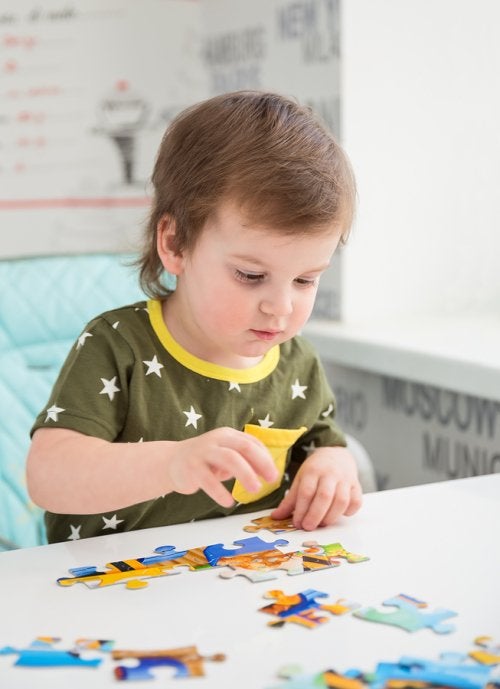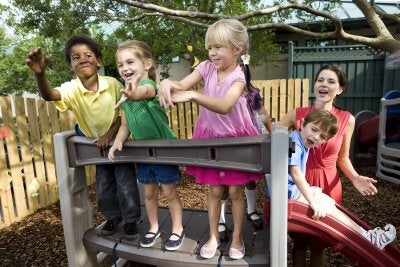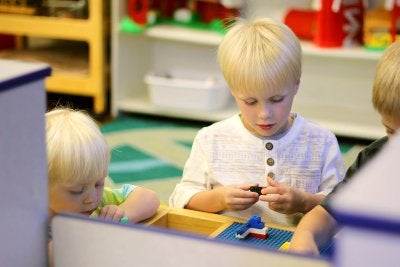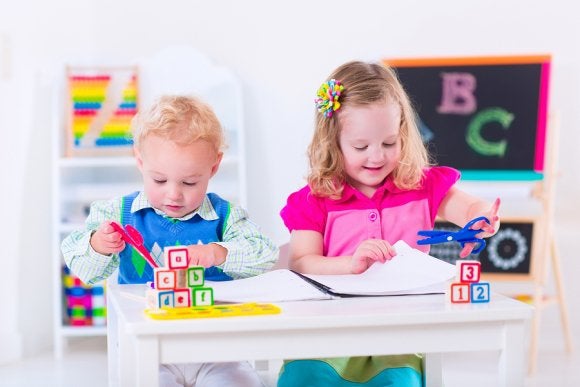-
How Your Preschooler Benefits from Nap Time
How much sleep a child needs and how it’s divided between daytime naps and rest at night depends on the child’s developmental stage. If your kid is of preschool age, then you may realize that this is an important time for child development. Growing properly requires plenty of sleep, making nap time an important part of her schedule whether your child is at preschool or at home. To learn about the benefits of nap time for children and why it’s so critical in a preschool setting, take a look at this infographic from Tanglewood Academy in Pembroke Pines . Please feel free to share this information with your friends and fellow parents.

-
Essential Tips for Library Visits with Toddlers
Going to the library is a great way to get your toddler excited about reading and to support the activities he or she is doing at his or her early childhood education center in Pembroke Pines . Library visits can be a fun and positive experience for your toddler and a good way to get him or her engaged in activities that don’t involve the television or your mobile device. Make the most of every library visit with this advice.

Set the Expectations
Before you go to the library, tell your toddler how you expect him or her to behave. Through being a student at an early learning center, your child will have practice following the rules and knowing when to be quiet and when to play, so put these skills to use in the library. Practice talking in a soft voice, and tell your child that he or she can only take one book off the shelf at a time. Remind your toddler to stay with you at all times. When you go into the library with these rules in place, you can focus on enjoying your visit instead of chasing your little one around.
Get Excited About Exploring
The library is full of wonders for your child, so let him or her have fun exploring every nook and cranny. As long as he or she sticks by you, let your child wander the aisles, look at the displays, and enjoy the toys and activities in the kids’ section. Don’t limit visits to just looking at books or just sticking to one section of the building. Getting your toddler excited about the library will get him or her excited about reading for life.Check Out Books
Your toddler will love the opportunity to pick out books to read together at home. Set a limit and help him or her browse, making selections together. Involve your child in the checkout process, and then use the opportunity to teach him or her about caring for books properly. Find a space at home that is just for library books, so they don’t get mixed with your own collection.
-
The Importance of Hands-On Puzzles for Your Child’s Development
Few things are as important in early education and child development as hands-on activities. Puzzles are often used in early education classrooms as a tool to help children learn. You can bolster your child’s success in early education in Pembroke Pines by keeping hands-on puzzles available at home as well.
Hands-on puzzles provide three learning experiences for early education students. First, they get the opportunity to work on fine motor physical skills by holding the pieces and working them into different positions until they fit. Students get to practice cognitive skills as they attempt to solve the problem presented by the puzzle. Young learners also build emotional skills by working on puzzles, as they must practice patience and perseverance as they work to solve the puzzle and then are rewarded with the satisfaction of finishing the puzzle. When children solve puzzles together, they also get to practice social skills and learn to compromise and work collaboratively. Provide a variety of different puzzle types to boost your child’s learning experience.

-
What Students Learn in First Grade
First graders learn by leaps and bounds. In first grade in Pembroke Pines, children develop a solid academic foundation in subjects like American history, geography, mathematics, and language arts. First graders are also encouraged to embrace their creativity through art. They develop an understanding of what it means to be part of a community outside of the home and they explore the importance of embracing social and ethnic differences.
Of course, every first grader learns at his or her own pace. However, most of them can read about 150 sight words, spell many words of up to three or four letters, and write full sentences. In math, first graders learn comparison skills and they can count up to 100. Most of them will also be able to add and subtract whole numbers and know how to tell time to the nearest half hour. Across all subject areas, first grade is generally the time in which children begin to grasp abstract concepts.

-
Encouraging Kids to Read
Long before your child is ready for preschool or kindergarten in Pembroke Pines, you can instill a lifelong love of reading in him or her. Reading is a cornerstone of early childhood education , even before your child can recognize the words. Read colorful, engaging picture books with your child and encourage him or her to interact with the story, such as by helping you turn the pages and speculating about what might happen next.
Watch this featured video to hear some tips from an early childhood education provider. Sujata emphasizes the importance of being a good role model by letting your child see you reading every day. She also discusses some fun games you can play with your child to support letter and word recognition.
-
The Importance of After School Activities
Participating in a variety of activities offers kids several benefits. If you’re thinking about enrolling your child in an after school program near Pembroke Pines, then continue reading to learn about the importance of these activities for children.

Developing New Interests
As your child continues to grow and develop, you may notice that she is embracing new hobbies and likes. When you enroll your child in after school programs, this gives her a chance to pursue sports and activities that interest her. At the same time, giving your child the opportunity to begin a program of her choice allows her to try something new and develop a diverse set of interests. Whether it’s soccer, drama club, or band, enrolling your child in programs like these can give her a chance to discover a passion that she can continue to pursue in the future if she desires.
Building Self-Esteem
While her academic classes can encourage teamwork, socialization, and confidence, after school programs can often do this to a greater extent and in a more relaxed setting. If your child tends to be shy, then enrolling her in after school activities may provide her with the outlet that she needs to interact more with others and build her self-esteem.
Improving Academic Performance
While you may not associate sports and other programs with your child’s grades, recent studies have identified a correlation between better academic performance and the work and behavior habits that develop because of participation in after school programs.
Strengthening College Applications
If your child is still young, then you may not be thinking as far ahead as college. However, no matter her age, fostering interests and passions now is a great way to help ensure that she continues to participate in activities through high school. No matter the type of after school programs that she ends up pursuing, being able to add these to her college application is an excellent way to improve her chances of acceptance.
-
Understanding Early Childhood Development
When your child attends an early childhood learning center near Pembroke Pines for preschool, kindergarten, or first grade, he will develop valuable life skills and reach key child development milestones faster. Early childhood development encompasses the emotional, social, and physical development of children between the ages of 2 and 8 years old.
Watch this video to learn more about the stages and importance of early child development skills. Jack P. Shonkoff, M.D., a Harvard professor, discusses the basic concepts of early child development, and the science behind it. Early childhood learning centers focus on fostering and encouraging the growth of early child development skills through the use of a comprehensive, well-rounded early childhood curriculum taught by professionals who have been trained and educated in encouraging independence, creativity, and healthy expression in children.
-
Encouraging Self-Help Skills in Your Pre-K Student
At around preschool age, or age two, your child should begin exhibiting signs of independence. You can help your child become more confident in his independence, self-reliance, and ability to self-soothe and help himself by enrolling him in a pre-kindergarten program near Pembroke Pines. Here are some other ways that you can encourage self-help skills in your pre-k student:

Allow him to dress and groom himself.
The first steps that you can take to encourage your child’s independence are to allow him to dress and groom himself. Let him pick out the clothes that he wants to wear to preschool or pre-kindergarten each day. Encourage him to tie his own shoes and button his shirts and pants. Try to build up to the stage where your preschooler can wash his hands on his own by putting a stepstool in the bathroom or kitchen, and providing an easy-to-use soap dispenser. You can also encourage him to brush his own hair and wash his own face.
Suggest that he clean up his own toys.
Prior to preschool or pre-kindergarten age, your child may have relied on you to clean up after him. By the time he begins preschool at an early childhood learning center, he should know how to clean up his own toys. Throughout his early childhood education, your child will be expected to put away the toys and materials he used during classroom activities. Stay firm at home when your child leaves a mess, and resist the urge to give in and clean it up for him. A huge part of helping your child fully develop independence and self-reliance is encouraging him to learn how to complete basic life skills on his own from a young age.
Prompt dialogue about feelings and needs.
Your child will be better at helping himself and self-soothing if he understands his feelings and knows how to talk about his needs. Don’t shy away from creating a dialogue with your preschool-aged child about how he is feeling, and how he can ease feelings of discomfort, anger, frustration, or sadness.
-
The Stages of Language Development
Did you know that early childhood education begins at birth? As soon as your child enters the world, he or she is soaking up knowledge from the world around him or her. You can begin preparing your child for preschool in Pembroke Pines even before his or her first birthday. The first stage of your child’s early education in language is the phonation stage. From one to two months, your child will develop vowel and throaty sounds.
Then, as the early education expert in this video explains, your child will enter the “goo” stage from two to three months. Here, you’ll hear the cooing sounds that are typical for babies. As your child grows, his or her babbling will gradually take on the rhythms of speech and gestures will be used to communicate. Most children say their first one or two words at around the time of the first birthday.
-
Building a Nurturing Education Environment for Toddlers
If you are looking for early childhood education in Pembroke Pines , you may be wondering what to look for in a nurturing toddler learning environment. At this stage of child development, it’s important for toddlers to cultivate warm and positive relationships with adults. Their educational environment should allow them to feel secure and help them to develop a sense of trust.
When choosing a toddler education center, look for places that promise an attentive staff who will be responsive to all of your child’s needs. Their caregivers should provide an environment where talking, playing, and interacting is a primary focus, and that provides a nurturing atmosphere in which your toddler can grow and learn about the world around him.
If you want to find a nurturing education environment for your toddler, look for one with highly-qualified and trained staff members. Ask questions to make sure you choose a loving and caring atmosphere where your toddler will be able to learn and flourish.

RECENT POSTS
categories
- Uncategorized
- Early Learning Center
- Pre-K
- Children
- Child Care Center
- Preschooler
- Preschool Blog Category | Tanglewood Academy
- Preschool Lunch
- Tanglewood Academy
- After-School Program
- Toddler School
- Early Childhood Education
- preschool activities
- pre-kindergarten
- childhood education
- pre-kindergarten programs
- Children’s education
- enrichment opportunities
- Kindergarten
- Nurturing Education Environment
- Toddler Care
- Child Separation Anxiety
- Toddlers
- Summer camp
- summer activities
- VPK
- Voluntary Pre-K
- Outdoor Activities
- Smart Strategies
- Tie Shoes
- Snacks
- Physical Activities
- Education
- Enrichment Activities for Kids
- Early Education Activities
- Preschool Curriculum
- Classroom Learning
- APPLE accreditation
- Language Comprehension
